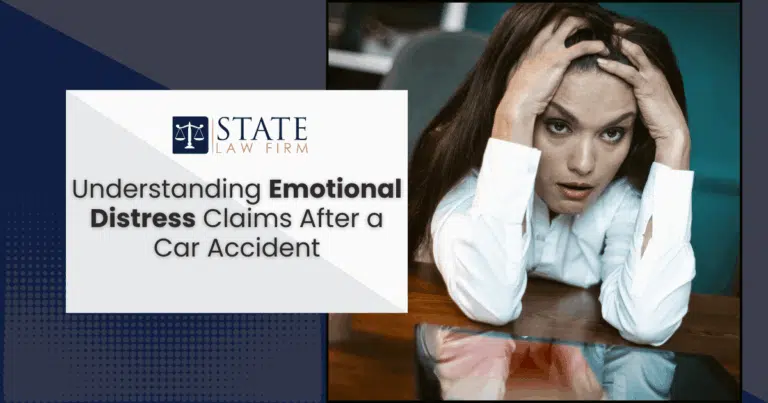Car accidents don’t just leave physical scars—they can also take a deep emotional toll. For many, the aftermath of a collision brings anxiety, depression, PTSD, or an overwhelming sense of fear that lingers long after the physical injuries have healed. A study published in the American Journal of Psychiatry found that nearly 39% of motor vehicle accident survivors develop post-traumatic stress disorder (PTSD), highlighting just how real and serious these emotional impacts can be. View source
At State Law Firm, we understand that the path to recovery isn’t always visible on the outside. As a boutique personal injury firm based in Sherman Oaks, our team of young, tenacious attorneys is dedicated to helping clients navigate the complexities of emotional distress claims with legal precision and genuine care. We believe that mental and emotional suffering deserve the same recognition and compensation as physical injuries, and we fight to make sure our clients’ stories are heard.
If you or someone you care about struggles emotionally after a car accident, this guide is here to help. We’ll walk you through the basics of emotional distress claims, how to prove them, and what kind of compensation you might be entitled to. And when you’re ready to take the next step, our Sherman Oaks car accident lawyers are just a call away, prepared to stand by your side and advocate for the justice you deserve.
What Are Emotional Distress Claims in the Context of Car Accidents?
When most people think of car accident injuries, broken bones or whiplash often come to mind. But for many, the more lasting pain isn’t physical—it’s emotional. Emotional distress claims stem from the psychological harm a person suffers as a result of a traumatic event like a car crash.
Legally, emotional distress falls under non-economic damages in a personal injury claim. It includes symptoms such as anxiety, depression, insomnia, panic attacks, loss of enjoyment of life, and even PTSD. These aren’t just feelings—they’re recognized forms of injury under California law. But unlike a broken arm, emotional distress isn’t visible on an X-ray, which can make proving these claims more nuanced and personal.
If you’ve been in a serious accident, know that your emotional suffering matters, and there are legal avenues to seek justice for it.
The Types of Emotional Distress: What You Need to Know
Emotional distress isn’t one-size-fits-all. It can manifest differently depending on the individual and the accident’s severity.
Common types of emotional distress after a car accident include:
- Anxiety and panic attacks
- Depression or prolonged sadness
- Sleep disturbances, including nightmares or insomnia
- Fear of driving or being in a car again
- Irritability or mood swings
- Post-Traumatic Stress Disorder (PTSD)
Pro Tip: Keep a daily journal to track your emotional state post-accident. This can later serve as supporting evidence in your claim.
Not all emotional responses will rise to the level of a legal claim, but if these symptoms disrupt your daily life, it’s time to explore your options. Speaking with a trauma-informed attorney can help you determine the strength of your case and what steps to take.
Establishing Your Case: How to Prove Emotional Distress After a Car Accident
Proving emotional distress isn’t just about saying you feel bad—it requires credible, consistent evidence. The more thorough your documentation, the stronger your case will be.
What you’ll need to support your claim:
- Medical records showing diagnosis and treatment by a mental health professional
- Therapist or psychologist evaluations detailing the emotional impact
- Testimony from family, friends, or colleagues about how your behavior has changed
- Medication records indicating treatment for anxiety, depression, or other emotional symptoms.
- Personal journal entries that reflect your mental and emotional state
At State Law Firm, we help clients gather and present this evidence in a way that’s compelling to insurers or the court. We understand how emotionally taxing this process can be—and we’re here to take the legal burden off your shoulders.
The Role of Legal Representation in Navigating Emotional Distress Claims
Let’s be honest: emotional distress claims are often met with skepticism from insurance companies. They’ll argue your symptoms are exaggerated or unrelated to the accident. That’s where we come in.
A skilled car accident attorney can:
- Help you document and organize evidence properly
- Connect you with reputable mental health professionals for support and evaluation.
- Negotiate with insurers who undervalue your suffering.
- Build a narrative that resonates with a jury if your case goes to trial.l
At State Law Firm, we’re not just trying to settle easy cases—we’re building our reputation on taking on the more challenging fights. We’ve built a boutique firm designed for personalized strategy and fearless representation. Emotional distress cases may be more challenging to prove, but they’re often the most worth fighting for.
The Compensation Process: What Can You Expect?
Compensation for emotional distress varies depending on the severity of your symptoms and how deeply your life has been affected. These claims typically fall under “pain and suffering” damages, and while there’s no exact formula, several factors will influence the outcome:
- The intensity and duration of your emotional suffering
- Whether a mental health professional has formally diagnosed you
- The impact on your personal and professional life
- The credibility of your supporting evidence
Insurers may use tactics to downplay the seriousness of emotional harm. However, settlement or litigation can secure a strong legal strategy and meaningful compensation.
If you’ve been struggling emotionally after a crash, you don’t have to go through it alone. Our Sherman Oaks car accident lawyers are here to guide you through every step of your emotional distress claim, with the empathy and legal firepower you deserve.


